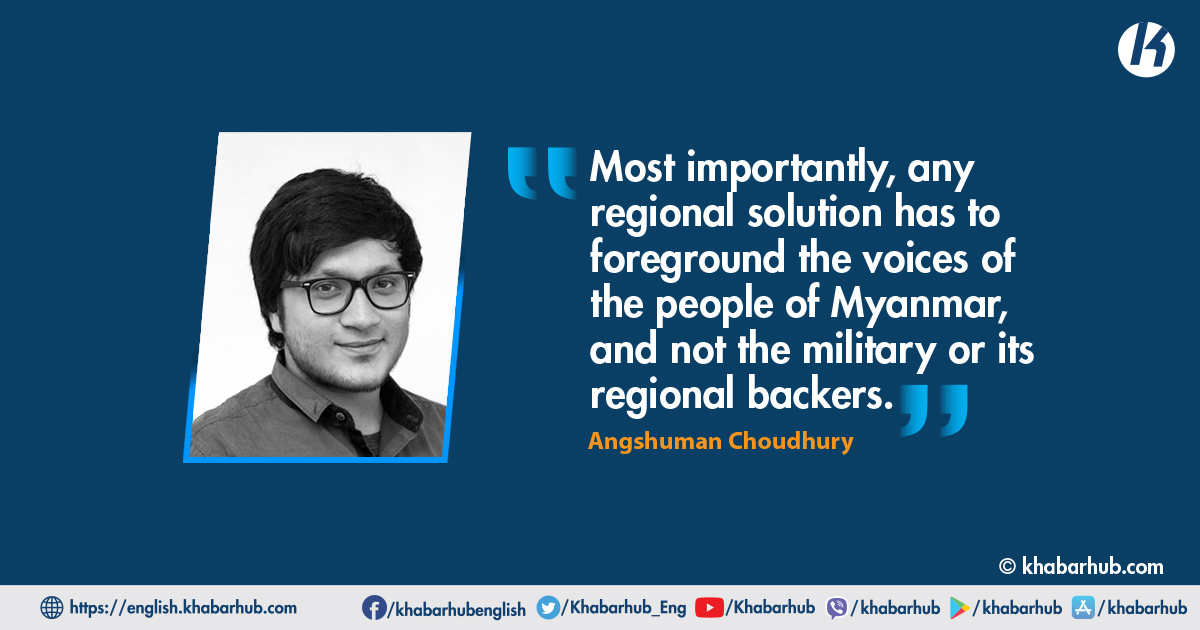Back in June, four months after the military in Myanmar deposed the elected civilian government and took charge of the country in a coup, the UN General Assembly (UNGA) passed a critical resolution that called for the release of political prisoners, restoration of the democratic process and a stop to the violence unleashed by the junta on peaceful protestors.
Passed by an overwhelming majority of 119-1, the resolution also urged member states to “prevent the flow of arms” to Myanmar.
Despite the strong support from the Assembly, 36 countries abstained from voting on the resolution – including Nepal and India. In fact, the entire South Asian region refrained from voting, almost as a single bloc.
The South Asian thinking on Myanmar seems to be that harsh international action on Myanmar may not be helpful in resolving the political crisis and those countries need to engage with the junta regime if they want to bring about any meaningful changes.
India, particularly, emphasized in its explanatory remarks during the UNGA meeting that any solution to the Myanmar crisis has to come from the region, and not from extra-regional powers.
This was a not-so-subtle reference to the passed resolution, which was primarily drafted and sponsored by major Western powers, such as the US, Canada, UK, Germany and France.
In early June, all ten ASEAN member states met with the Chinese foreign minister, Wang Yi, in Chongqing and requested Beijing’s help in resolving the Myanmar crisis.
However, at the moment, the only regional entity that South Asian powers are relying on to resolve the Myanmar crisis is the Association of South East Asian Nations (ASEAN).
They seem to have put all their eggs in one basket, trusting the regional organization to find a quick solution. Some progress has indeed been made on this front. In April, ASEAN agreed to a ‘Five Point Consensus’ to resolve the crisis in Myanmar and followed it up with the appointment of a Special Envoy four months later (who is yet to visit the strife-torn country).
Despite these, not much can come out of the ASEAN process. In this case, the proverbial basket of eggs is small and frail.
Under the current circumstances and given ASEAN’s structural makeup, it is highly unlikely that the 10-member organization will be able to ease the situation in Myanmar, which is rapidly descending into a full-scale civil conflict. There is more than one reason behind this.
First, ASEAN is not designed to resolve internal political crises. This is primarily owing to its common principle of non-interference in the internal affairs of member states.
Add to this the extreme and deeply entrenched nature of the civil-military conflict in Myanmar, which spans decades of failed negotiations, broken promises and bad blood.
Such a hardened situation demands strong-willed political mediation – the kind that ASEAN is not equipped (and not willing) to provide.
Even in the 1990s and early 2000s, when the junta in Myanmar kept Aung San Suu Kyi under house arrest for a prolonged period and continued to rule by fear, ASEAN was reluctant to push the Myanmar military into a corner.
Second, ASEAN is deeply divided over the Myanmar issue. Four out of ten member states had abstained from the UNGA resolution in June, showing how they differ in what approach to take on the crisis.
The governments of countries like Thailand, Cambodia, Lao PDR, Brunei and Vietnam, which themselves have authoritarian or semi-authoritarian tendencies, do not want to start pro-democracy revolutions amongst their own people by openly rooting for pro-democracy forces in Myanmar.
On the other hand, those like Indonesia and Malaysia have been more vocal against military rule in Myanmar. Singapore, a powerful ASEAN power, too has noted ASEAN’s inability to make meaningful interventions without the junta’s approval.
Since the organization takes all decisions with full consensus, this internal fracture means that it won’t have a coherent strategy on Myanmar anytime soon.
Third, public faith in Myanmar in ASEAN and its attempt to resolve the crisis is dismal. Pro-democracy groups, such as the Civil Disobedience Movement (CDM), believe that ASEAN is an anti-people organization that is hand in glove with the junta.
Tweets from the CDM’s verified account such as “STAY OUT OF MYANMAR. WE DON’T WANT ASEAN, THE SUPPORTER OF SAC” have become common (SAC or ‘State Administrative Council’ is the official name of the current junta government).
This popular anger against ASEAN has only deepened due to the organization’s one-track engagement with the junta.
So far, it has not formally engaged with the National Unity Government (NUG), which is made up of elected lawmakers. This makes the organization look like an anti-democratic force in today’s Myanmar.
Thus, Myanmar’s neighbors who care about democracy in the country – and they should – need to stop heaping it all on ASEAN’s shaky shoulders and get more creative on the crisis in Myanmar.
With such poor public credentials and trust amongst the people of Myanmar, any attempt by ASEAN to resolve the crisis will only fall flat on the ground.
Fourth, the ASEAN process on Myanmar has become hostage to larger geopolitical agendas. While both India and China have reposed their faith in the process, it is the latter that has been successfully able to use it as a means to strengthen its own legitimacy in the region.
In early June, all ten ASEAN member states met with the Chinese foreign minister, Wang Yi, in Chongqing and requested Beijing’s help in resolving the Myanmar crisis.
During the same time, China hosted a special summit with ASEAN to commemorate thirty years of relations between both in which a representative of the Myanmar junta served as the co-chair.
This intimacy between ASEAN and China isn’t seen favorably by most people in Myanmar who view Beijing as a firm supporter of the military junta. For ASEAN, this could create unnecessary baggage in its own mediational efforts.
It is to be noted that the ASEAN Special Envoy is yet to visit Myanmar almost two months after his appointment, thanks to the junta’s delaying tactics.
The Five-Point Consensus too is yet to be implemented. In fact, both the junta and ASEAN, with China’s backing, are using the process to postpone any concrete action on the crisis.
This mutually beneficial arrangement will only prolong the dire political crisis while stalling any meaningful interventions from other willing parties.
Thus, Myanmar’s neighbors who care about democracy in the country – and they should – need to stop heaping it all on ASEAN’s shaky shoulders and get more creative on the crisis in Myanmar.
This could mean creating an alternate regional forum for conflict resolution that includes middle powers such as India and Japan who have a good rapport with all sides in Myanmar.
More importantly, any regional solution has to foreground the voices of the people of Myanmar, and not the military or its regional backers. In today’s context, this means rooting for the restoration of the democratic process, urging the junta to immediately release all political prisoners and ceasing fire, and supporting independent accountability initiatives to bring perpetrators of human rights abuse within the Tatmadaw to account.
(Angshuman Choudhury is a Senior Researcher and Coordinator of the South East Asia Research Programme at the Institute of Peace and Conflict Studies, New Delhi)








Comment